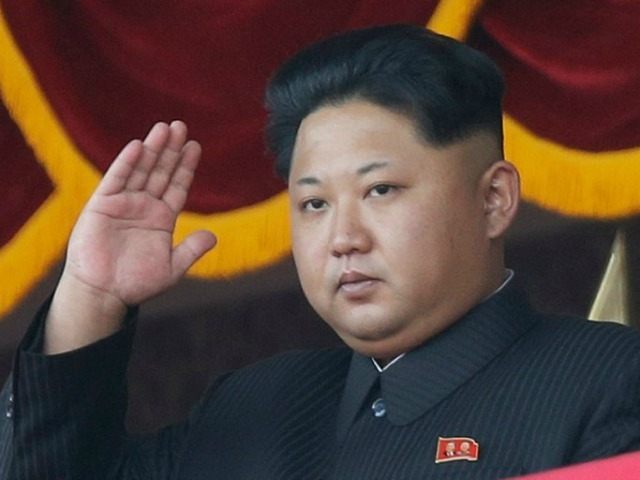In a state-controlled outlet, the North Korean government threatened Sunday to use its new alleged hydrogen bomb technology to reduce Manhattan, New York, to rubble, warning that its nuclear weapon “is much bigger” than Soviet weaponry.
The Washington Post has translated parts of the article in DPRK Today, a publication rarely used for the purpose of military bluster. When North Korean officials seek to announce military developments or threaten other countries, it usually turns to the state-run Korean Central News Agency (KCNA) or the Rodong Sinmun, the state newspaper. Both outlets have online English versions, making them more accessible to international media.
The DPRK Today article–run with the byline Cho Hyong Il, allegedly a North Korean nuclear scientist–warns, “Our hydrogen bomb is much bigger than the one developed by the Soviet Union.” It muses, “If this H-bomb were to be mounted on an intercontinental ballistic missile and fall on Manhattan in New York City, all the people there would be killed immediately and the city would burn down to ashes.”
The KCNA did run a nuclear threat article this weekend, but it did not specifically target the United States. Instead, KCNA threatened a “preemptive retaliatory strike” against the United States and South Korea for joint military drills being held at the border. The drills, named Key Resolve and Foal Eagle, feature 300,000 troops, engaged in a simulation exercise in which they are to practice the invasion of Pyongyang and restoration of stability after the fall of Kim Jong-un.
“Over 27 000 [sic] U.S. imperialist aggressor troops deployed in south Korea are within the firing range of the merciless ultra-modern strike means of the DPRK,” an article in Rodong Sinmun reads, describing the drills. The newspaper describes the premise of the military exercises as a threat of an actual invasion of Pyongyang, not just practice for when the Kim regime falls. “They may ignite a nuclear war if they wish to perish. Once there is a sign of such provocation, the ultra-modern strike means, nuclear weapons of the DPRK, will preempt a counter-action to have the pent-up wrath and grudge settled,” the article concludes.
This is far from the first time North Korea threatens a nuclear strike on the United States. In February, a KCNA statement warned that the “U.S. mainland” was the second on a list of nuclear targets topped by the Cheongwadae, South Korea’s presidential residence. “All the service personnel and people of the DPRK are ready to immediately and mercilessly punish without slightest leniency, tolerance and patience anyone provoking the dignified supreme headquarters even a bit,” the article reads.
A week later, KCNA announced that Kim Jong-un had visited a nuclear facility and “guided the work for mounting nuclear warheads on ballistic rockets.” The report asserted that North Korean scientists had succeeded in miniaturizing a nuclear warhead, allowing it to be placed on long-range ballistic missiles. Independent outlets have not confirmed this claim, though South Korean newswire Yonhap described the item in the photos release as appearing “to be a mockup of a round-shaped nuclear warhead that could be mounted atop the KN-08 missile.”
The latest round of belligerent threats from Pyongyang follow a call by the United Nations Human Rights Council to prosecute North Korean officials for human rights abuses. “I would like to reiterate my appeal to the international community to move forward to ensure accountability of the senior leadership of the Democratic People’s Republic of Korea, including that of Mr. Kim Jong-un,” HRC member Marzuki Darusman said at a meeting Monday, which the North Korean delegation boycotted.
South Korean President Park Geun-hye vowed Monday to “sternly and strongly deal with North Korea” following the new round of threats. In remarks last week, U.S. State Department spokesman John Kirby also condemned the recent string of belligerent behavior out of Pyongyang. Warning dictator Kim Jong-un away from “provocative rhetoric,” Kirby told reporters, “I’d say that the young man needs to pay more attention to the North Korean people and taking care of them than in pursuing these sorts of reckless capabilities.” He did assert that the United States “takes these threats seriously,” though repeatedly referred dismissively to Kim as a “young man.”
In addition to warnings from South Korea and the United States, the government of Russia, which has typically opposed sanctions on North Korea at the United Nations, warned that Pyongyang could be exposing itself to attack through its violent rhetoric. “We consider it to be absolutely impermissible to make public statements containing threats to deliver some ‘preventive nuclear strikes’ against opponents,” a Russian Foreign Ministry statement read last week, warning that other countries could have “legal grounds for using military force” against North Korea should the belligerent statements continue.

COMMENTS
Please let us know if you're having issues with commenting.